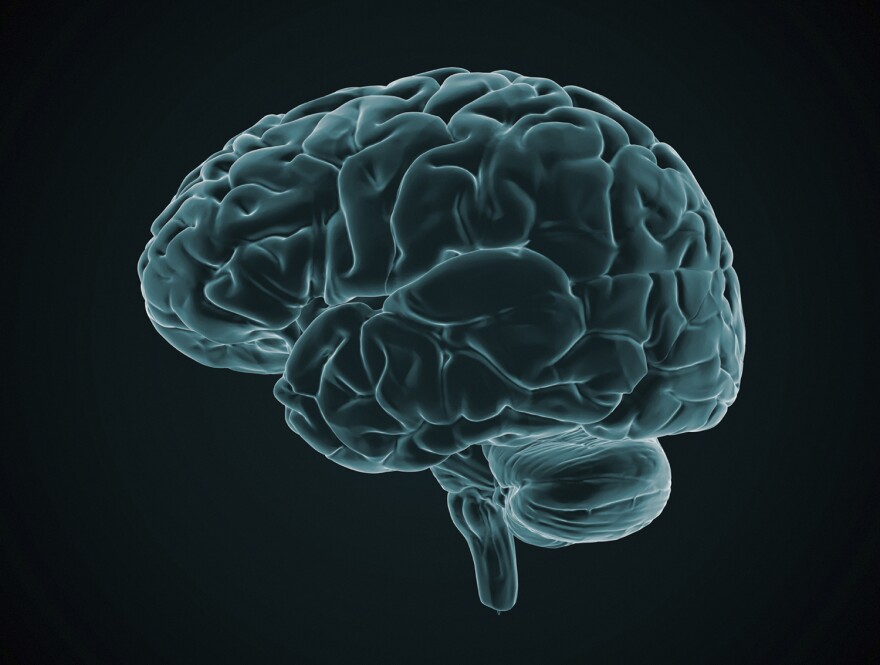The National Center for Post-Traumatic Stress Disorder is looking for brains. The center, in White River Junction, is run by the Department of Veterans Affairs and it's opening the world's first national brain bank for PTSD . It's a physical library of veterans' brain tissue to help researchers learn more about PTSD.
Dr. Paula Schnurr, the center's new executive director, and Dr. Matthew Friedman, a senior advisor to the center, joined VPR to explain why they want veterans' brain tissue, and what they're going to do with it.
"We know a lot about how PTSD alters brain structures and brain functions, through brain imaging and through sophisticated laboratory techniques, but there's a limit to how much we can actually learn from these techniques," Friedman says. "There's no substitute for actually looking at the brain tissue itself, analyzing the tissue for its DNA, looking at how the different nerves are are connected to one another."
Friedman says the the center is looking for people who've had no psychiatric problems, for comparison, and for people "who've had some of the psychiatric problems that frequently occur with PTSD, like depression or substance use disorders — or, for many of our returning veterans, a traumatic brain injury."
Most people think of PTSD primarily as an emotional or a mental disorder that stems from some trauma, not one that can actually change the very physicality a person's brain. But Dr. Friedman says this is exactly what happens.
"We also know that this is true for other mental disorders as well, because mental illness is a real illness. The brain is an organ, the biggest and most important organ in the body," he says. "By understanding how the function of that organ has been affected adversely by this disorder, that's really a clue to moving forward, in many respects."
"There's no substitute for actually looking at the brain tissue itself, analyzing the tissue for its DNA, looking at how the different nerves are are connected to one another." - Dr. Matthew Friedman, National Center for Post-Traumatic Stress Disorder senior advisor
Researchers think that looking at brain tissue could help them identify bio-markers that could lead to some big steps in PTSD treatment.
"We're not all created equal in terms of our capacity to withstand the impact of a traumatic event," Friedman says. "Some of us are much more vulnerable and some of us are much more resilient. We can identify people at risk. We can help ... them to become more resilient so that when a trauma occurs, they will be better positioned to withstand the impact of that and less likely to develop PTSD."
The brain bank is just one part of a new direction in the research of PTSD that's happening at the center. Dr. Schnurr says there are additional plans in the works.
"One of our greatest priorities is ... treatment, but taking the treatments we have and making them more efficient, more available and ultimately more effective," Schnurr says.
"One of our greatest priorities is ... treatment, but taking the treatments we have and making them more efficient, more available and ultimately more effective." - Dr. Paula Schnurr, executive director
The center is developing strategies to improve access to treatment, such as video teleconferencing on Skype, so that patients don't always have to come in to the clinic.
"Here in Vermont, for example, a rural veteran could get care perhaps in the privacy of his or her home or in a nearby clinic rather than traveling to the hospital in White River Junction," Schnurr says.
It's unclear how long it will be before a veteran with PTSD who needs help could actually begin to feel the effects of this research.
"That question is hard to answer because it depends on what we find," Schnurr says. "A breakthrough finding early on could change things substantially."
Schnurr says she imagines the progress will be over the course of "years, and not months, and it may be more years rather than fewer years."
"Right now we can help most people," she adds. "Many people still continue to have some symptoms, and so we're hoping with the research on tele-health, [and] with the research on in the brain bank and in other venues, that we can increase that cure rate so that people not only have fewer symptoms, they have no symptoms."





